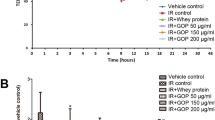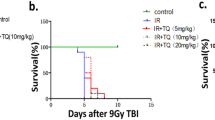Abstract
The aim of the study was to investigate the influence of radiotherapy on IL-2 and IL-6 secretions of mucous epithelial cells of small intestine and the inhibition effect of deproteinized calf blood extractive (DCBE, also known as Actovegin in trade name) on apoptosis of mucous epithelial cells of small intestine. 50 wistars were randomly divided into 5 groups with 10 in each including normal group (NG), radiation group (RG), low-dose Actovegin group (L-AG), middle-dose Actovegin group (M-AG), and high-dose Actovegin (H-AG). High-energy X-ray linear accelerator was used for abdominal irradiation of RG, L-AG, M-AG, and H-AG at the exposure dose of 9.0 Gy to establish the wistar radiation damage model. Modeling wistars were injected with medicine for successive 4 days, and their small intestinal mucosas were extracted as pathological sections; then fully automated analyzer was employed to detect their IL-2 and IL-6 levels. Immunohistochemical analysis was carried out to explore the effect of Actovegin on apoptosis of mucous membrane epithelial cells of small intestine. The IL-2 and IL-6 levels of RG are significantly higher than other groups and differences are statistically significant (P < 0.05); however, the IL-2 and IL-6 levels of L-AG, M-AG, and H-AG are higher than NG; there is no statistically significant difference between them (P > 0.05). Compared with RG, the villus height, membrane thickness, crypt depth, and whole layer thickness significantly improved (P < 0.05). However, the expression levels of apoptosis-related protein bax of M-AG and H-AG are significantly lower than RG, and their bcl-2 levels are higher than RG with significant difference between them (P < 0.05). Actovegin is capable of effectively inhibiting the expression of apoptosis-related protein bax and facilitating the expression of anti-apoptosis protein bcl-2, having preferable remediation effect on mucous membrane epithelial cells of radioactive enteritis.
Similar content being viewed by others
References
Tan, L., Dong, W., Liu, J., et al. (2011). Influence on radiation-induced IL-6 and PAI-I secretion of intestinal mucosal epithelial cells. China Cancer, 10(2), 623–624.
Ong, Z. Y., Gibson, R. J., & Bowen, J. M. (2010). Pro-inflammatory cytokines play a key role in the development of radiotherapy induced gastrointestinal mucositis. Radiation Oncology, 5(2), 128–129.
Du, Q., & Wang, R. (2011). Pathogenesis of radiation-induced stomatitis J. International Journal of Oncology, 6(3), 458–459.
Seardina, G. A., Pisano, T., & Messina, P. (2010). Oral mucositis. Review of literature. New York State Dental Journal, 5(2), 452–453.
Zhang, X., & Zhang, L. (2011). Scanning electron microscope observation of mucous membrane of diabetic mice small intestine. Chongqing Medicine., 28(2), 424–425.
Chuo, J., Yu, Q., Xu, L., et al. (2010). Change of Intestinal motility and intestinal mucosal impairment in rats with cerebral arterial thrombosis. Journal of Capital Medical University, 3(5), 158–159.
Li, W., Tu, X., Huang, S., et al. (2012). Folate deficiency-induced aberrant DNA methylation patterns in NCM460 and tumorigenesis of colorectal cancer. Chinese Journal of Experimental Surgery, 2(5), 785–786.
Ao, X., Zhao, L., Davis, M. A., et al. (2009). Radiation produces differential changesin cytokine profiles in radiation lung fibrosis sensitive and resistant mice. Hematological Oncology, 2(6), 512–513.
Han, L., Mei, Q., Huang, J., et al. (2012). Effects and mechanism of anti-tumor necrosis factor-α on intestinal permeability in dextran sulfate sodium induced colitis mice. Chinese Journal of Digestion, 6(2), 478–479.
Haase, M. G., Klawitter, A., Geyer, P., et al. (2003). Sustained elevation of NF-kappaB DNA binding activity in radiation-induced lung damage in wistars. International Journal of Radiation Biology, 79(11), 863–877.
Ginsberg, G. M., Lim, S. S., & Lauer, J. A. (2010). Prevention, screening and treatment of colorectal cancer: A global and regional generalized cost effectiveness analysis. Cost Effectiveness and Resource Allocation, 5(2), 782.
Smolianinov, A. B. (2000). Actovegin treatment of duodenal ulcer associated with ischemic heart disease and diabetes mellitus. Klinicheskaia Meditsina (Moscow), 78(6), 24–28.
Li, F., Chen, A., Du, J., et al. (2010). Expression of co-stimulators in ulcerative colitis and its pathologic significance. Chinese Journal of Pathology, 1(2), 326–327.
Yuan, C. (2012). Study progress on acute radiation pneumonitis relevant biological factors. The Practical Journal of Cancer, 2(5), 745–746.
Author information
Authors and Affiliations
Corresponding author
Rights and permissions
About this article
Cite this article
Liu, B., Li, X., Ai, F. et al. The Influence of Radiotherapy on IL-2 and IL-6 Secretions of Mucous Membrane Epithelial Cells of Wistar Small Intestine. Cell Biochem Biophys 71, 35–38 (2015). https://doi.org/10.1007/s12013-014-0158-3
Published:
Issue Date:
DOI: https://doi.org/10.1007/s12013-014-0158-3




